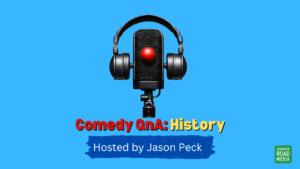Well, I finally finished putting together my generic Late Night Comedy Writing packet. I finished it back in November, and now have a potential sample that I can tweak if I decide to look for Late Night writing jobs.
I can thoroughly recommend buying a copy of late night comedy writer, Joe Toplyn’s book, Comedy Writing for Late-Night TV. Which is reviewed here:
Whether you want to pursue the Late Night Comedy writing path, or not, the book provides you with a ton of useful skills you can add to you comic toolbox. Skills which are transferrable to different mediums.
I’m not going to re-create the content of his book here but I will say he recommends having a page of monologue jokes, not written as a monologue, but single jokes. At least one sketch. As well as ideas for desk pieces, audience participation, etc. A generic packet should be about 8 pages in industry standard Courier 12.
Once you’ve put all the initial work in creating a generic packet, your job then becomes a little easier to tweak it to a specific late night show.
I’m glad I went through the process and have another writing sample for my portfolio (in addition to a short film and an original sitcom pilot I wrote earlier this year). But as I put it together, I learned something about myself.
Cue: generic info graphic of someone reaching to the sun with an out of context quote mis-attributed to the Dalai Llama.
What I learned is this… I’m not sure I want to write for other people.
Now, I know that comedians who create their own content Jerry Seinfeld, Ricky Gervais, Donald Glover, Louis CK, Woody Allen, etc. have all, at some point, had jobs writing for others. But ultimately, they moved on from those jobs in order to create their own shows, movies, etc.
In the past, having written material for a couple of sketch shows, I’ve been frustrated at not having performed the material myself. I guess that’s the problem of being a writer-performer.
I’m not going to discount this path yet, as that would be foolish.
But it is something I need to think about. Do I really want to put a lot of energy in pursuing a job where I create material that I’m ultimately either not going to perform or that might not even see the light of day?
What about you and your comedy journey?



